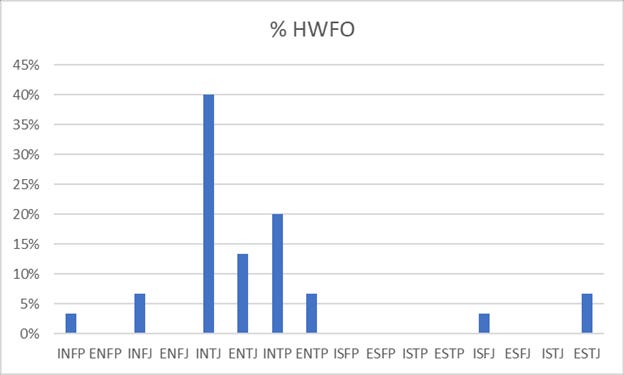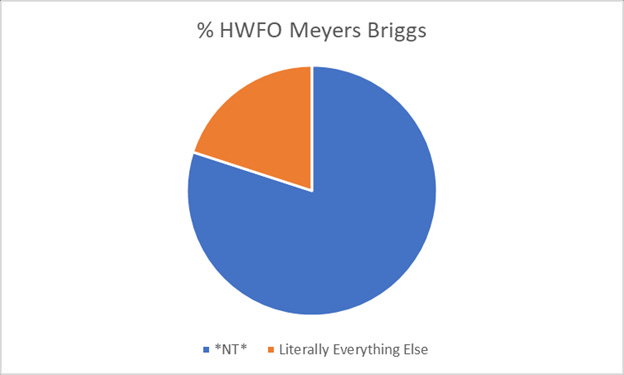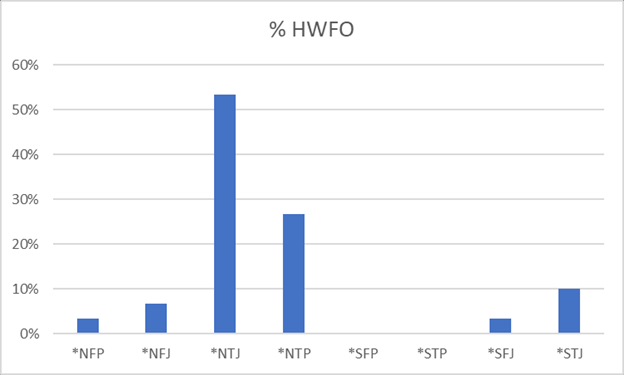Intuition Reigns Supreme
An inward looking statistical analysis of the HWFO echo chamber
On my appearance on Rebel Wisdom, David Fuller asked me if I was captured by an egregore. I sufficiently answered the question with what sounded like, and may in fact have been, a huge dodge. By the HWFO formulation of “egregore,” nobody who’s captured by one could know that they were captured by one, so it was literally impossible for me to answer. I stand by that, but I also know that if you’re going to run a publication that spends all day screaming about echo chambers, and in fact uses mathematical analysis to point them out, it would be the height of conceit to refuse to analyze your own. And HWFO has a golden opportunity to investigate this. We have an interesting function built into what we do around here, where we have a Slack channel trafficked by our paid readers where they shit off all day with opinions and hot takes that are not permissible in the public eye under the cloud of cancel culture, tech censorship, financial retribution by angry Canadians, and such. And they also like to answer polls.
In the spirit of transparency, I bring you the results of the first ever HWFO Personality Test questionnaire.
Methodology
I chose Meyers Briggs for the format, instead of some more well known personality tests such as the Big Five, because lots of people already know their Meyers Briggs. The test is polluted by selection bias, because it is:
only of subscribers to HWFO and not casual readers,
only of subscribers who chose to join the Slack channel, and
only of subscribers who actively participate in it as a part of their daily routine.
This filtered the pool from 1354 possible data points to 120 possible data points to 30 actual respondents. Still quite a good sample though. This selection bias would most significantly taint the data if it could be shown that certain personality types are more prone to shit off on private chat rooms all day than other personality types. I have no suggestion for how to control this, other than to run a similar poll in the general Substack.
That said, the poll still works very well to identify and characterize the nature of the echo chamber that exists within the daily participants on the Slack channel, so even if it is biased against the general reader pool, it is still very useful to those participating in the discussion community.
Some results were surprising, some not.
Hypothesis
I am an ENTJ. I write like I am, so I expected to see some ENTJs. I used to be an INTJ before I was a soccer referee, a radio DJ, an engineering department head, a writer, and a podcaster, so I expected to see a lot of INTJs as well. There’s not a lot of woo in this publication, so I didn’t expect to see many of the woo personalities. I expected to see a lot of I (introvert) personalities simply because nerds are I’s. But I also expected to see a lot of S personality types (sensing) over N personality types (intuition) because of the material. HWFO material is deeply connected to data and showing how real-world observations do not fit the media narratives. I was dead on with the first hypothesis, pretty good with the second, and dead wrong with the third.
Results
Raw scores of the poll showed an even higher preponderance of INTJs than I expected. But the clustering around Ns and Ts was really surprising. We have a lot of NTs, or “intuitive thinkers,” and literally zero “sensing feelers.” This blog is clearly an NT blog.
Broken down by individual category, it looks like this:
Opposing personality types here are color coded. I was correct that introverts outnumber extroverts, but thinkers vastly outnumber feelers, and intuitives outnumber sensers by an even larger ratio. I did not expect that. Expressed as ratios of opposing personality types, the numbers look like this:
Intuitives outnumber sensers by 9 to 1, thinkers outnumber feelers by 6.5 to 1. I also noticed something very curious in one of my other breakdowns.
If you throw out introversion/extroversion as an analysis metric, then the two main clusters are around NT and SJ. Or, put another way, our Ns tend to be Ts, and anyone who isn’t an N are all Js. If you are an HWFOer who forms your sensemaking of the world by sensing instead of intuition, then you universally frame your outer life behaviors based on your decision making preference (thinking or feeling) instead of framing your outer life behaviors based on your perceiving function (sensing or intuition). Basically, everyone who pinged “sensing” doesn’t use it in their outward life behavior.
This is a very curious echo chamber.
Analysis
I think the sampling bias issue here is probably significant, and the respondents are weighted towards people who have the professional time and ability to argue anti-narrative discussion points on the internet during business hours. I think a large part of the Ns dominating the discussion is that people seek out HWFO to gain new intuitions about the world. The N’s, intuitives, dominate this pool so strongly that even the S’s we do have don’t use it to inform their behavior, which would lead me to believe they are probably soft S’s to begin with.
In short, intuition reigns supreme on HWFO. Good or bad, at least we now know it.









Interesting. I'm an IN(soft-F)J, so yeah, that tracks.
An even more striking comparison would be of the HWFO results to those of the general population. My recollection is that INTJ (Go Team!) are less than 4% of the population compared to 40% here.